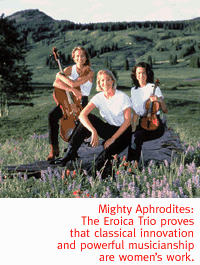
The Eroica Trio Arrives, All Dressed Up With Everywhere To Go.
By Dave Irwin
SOMETIMES IT'S LIKE a fairy tale: three childhood friends
accidentally discover they have a power to make music that delights
beyond all expectations.
The Eroica Trio found that magical moment the first time they
played together as students at Julliard. Pianist Erica Nickrenz
and violinist Adela Peña first played together at age 9.
Cellist Sara Sant'Ambrogio met Nickrenz at age 12, when Nickrenz
was taking lessons from Sant'Ambrogio's grandmother. They started
playing together at age 15. Finally, in 1986, all three got together
for a casual student run-through of Mendelssohn's Trio in C minor,
Op. 66.
 "It was in a Julliard practice room just to read together,"
Nickrenz remembers. "We were playing the exposition of the
first movement. We could have just screamed. It was great!"
"It was in a Julliard practice room just to read together,"
Nickrenz remembers. "We were playing the exposition of the
first movement. We could have just screamed. It was great!"
"We just knew that we would die if we didn't play together
as a trio," adds Sant'Ambrogio. "There was no choice.
We would have walked through fire to get to where we are now."
Nickrenz notes, "It was kind of amazing because there was
no agonizing decision making. We'd played in groups with lots
of other people at that point, so we knew when it was good. From
that first day we took it very seriously and had a game plan to
make it our lives."
The Eroica Trio will perform in Tucson on February 10. The program
will include Arnold Shoenberg's Verklacte Nacht, Op. 4,
and Eduardo Lalo's Trio in D minor, Op. 7. The centerpiece
will be the world premier of a work commissioned by the Arizona
Friends of Chamber Music by composer Raimundo Penaforte.
According to Penaforte, each section of the three-movement work
is named after the composer that inspired it. Astor, influenced
by the tango, is named after Argentine composer Astor Piazolla.
The second movement, Maurice, was inspired by Penaforte's hearing
the Trio play the Passacaglia section of Ravel's Trio in A
minor. It features a blues progression in the bass parts with
solos above. The third movement is Capiba, named after the famous
Brazilian composer.
"This is like the height of decadence," Sant'Ambrogio
says by phone from a five-star resort on Lanai, Hawaii, in between
engagements on a four-island concert tour. They're watching dolphins
from the balcony of Sant'Ambrogio's beach-side suite. Named after
Beethoven's Eroica Symphony ("heroic" in Italian),
the trio plays approximately 80 concerts a year. From the start,
their tight ensemble playing caught the attention of critics.
"We've evolved through being together for so long,"
Nickrenz explains. "We imitate each other's gestures and
we play like one person. We finish each other's sentences."
Maybe so, but each member has strong credentials. Sant'Ambrogio
comes from a line of musicians stretching back 600 years. Her
father is principal cellist with the St. Louis Symphony, where
the trio will perform the Beethoven Triple Concerto in C Major,
Op. 56, in March. She has been playing since she was 2 years
old. Her awards include first place in the all-Julliard Shumann
Competition, and taking a 1986 bronze medal in the Moscow International
Tchaikovsky Cello Competition. "We were very prepared for
how hard it is to achieve what we've been able to achieve,"
she says.
 Nickrenz also hails from a musical family, but she started playing
later in life--at age 6. She's been a featured soloist on PBS'
Live from Lincoln Center, and has played the Tanglewood
and Marlboro festivals. Her father, a violist, is a founder of
the Lenox, Claremont and Vermeer Quartets. Nickrenz does not apologize
for the elegant image Eroica has created.
Nickrenz also hails from a musical family, but she started playing
later in life--at age 6. She's been a featured soloist on PBS'
Live from Lincoln Center, and has played the Tanglewood
and Marlboro festivals. Her father, a violist, is a founder of
the Lenox, Claremont and Vermeer Quartets. Nickrenz does not apologize
for the elegant image Eroica has created.
"As young women, we're attracted to wearing beautiful gowns,"
she concedes. "Just being comfortable on stage, we wear sleeveless
or very strappy gowns because we want to have a lot of freedom
playing. It's part of the show, to feel in character to perform.
If we went out there in jeans, it just wouldn't reflect who we
are as people."
As a teenager, Peña won the Julliard Mendelssohn Violin
Competition. She has served as concertmaster for the Orpheus Chamber
Orchestra, a vital position in that conductorless ensemble. She
notes that AFCM requested that they perform Verklacte Nacht,
which was originally written for string sextet. "It was transcribed
by a student of Shoenberg's, Edward Steurmann," she explains.
"It's an amazing expansion on the piece. It lends a whole
new voice with the piano. You get the string sonority and then
you get the sheer volume and power and scariness that the piano
can create. It's the perfect piece for us to do."
Their image may precede them, but the Eroica Trio is about solid
musicianship. Nickrenz admonishes, "If part of the package
is having beautiful outfits, it's certainly not the focus of our
working together. It was surprising to us when people started
talking about this glamorous image. It's just who we are, but
thank you for calling it glamorous."
The Arizona Friends of Chamber Music present The Eroica Trio
in concert at 8 p.m. Wednesday, February 10, at the TCC Leo
Rich Theatre, 260 S. Church Ave. Tickets are $14 general,
$4 for students. For reservations and information, call 577-3769.

|





